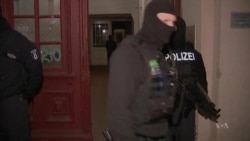Security was significantly increased Saturday in Belgium, Germany and elsewhere in Western Europe, following raids in which dozens of suspected Islamic terrorists were arrested.
Thousands of police were spread out across Belgium guarding possible terror targets, including buildings within the Jewish quarter of the port city of Antwerp. Soldiers were also guarding installations in the capital, Brussels, including the Jewish Museum of Belgium.
Up to 300 members of the military will be stationed at locations such as the U.S. and Israeli embassies in Brussels and NATO and EU institutions. Troops will reinforce police at least until Thursday, when authorities will review the national threat level, set at 3 on a scale of 4 this week.
"It's very important to say that this wasn't a simple decision. But it was necessary, at a time when police are overly engaged, for the army to enter in a supporting role," Defense Minister Steven Vandeput told reporters.
On Thursday, two gunmen were killed in the Belgian town of Verviers during raids on an Islamist group that authorities said was planning to attack police. Police said some members of the group had returned from Syria. Related raids across the country resulted in arrests of 13 others, Belgian officials said.
On Saturday, Greek police said they had detained at least four people for questioning in connection with the foiled plot in Belgium.
It was widely reported that one of the suspects detained in Athens matched the description of Abdelhamid Abaaoud, suspected mastermind of the group that Belgian police raided Thursday. But no link had been confirmed by early Sunday.
Abaaoud, a Belgian citizen of Moroccan origin, was thought to have been hiding in Greece.
It wasn't clear whether the Belgian group was linked to the recent terrorist attacks in France that left 17 people dead.
In Germany, security was increased at transport sites, including the Dresden train station. Police said they had arrested two men in Berlin on suspicion they were recruiting fighters for the Islamic State group in Syria.
The suspects were detained Friday during a series of raids by more than 200 police officers on 12 properties in the German capital.
In Ireland, police arrested a suspected French-Algerian militant at Dublin Airport when he tried to enter the country using a false passport.
Around Paris, police arrested 12 people with suspected ties to the gunmen who carried out last week's attacks in the French capital.
In an interview with The Associated Press on Friday, the head of the European Union's police agency, Europol, said Europe must cooperate more closely to prevent attacks like the deadly incidents in Paris.
Rob Wainwright said the large number of radicalized Muslim extremists across Europe, plus their lack of command structure and growing sophistication, makes it "extremely difficult" for law enforcement agencies to foil every terrorist attack.
The massive security operation is hunting for potential terrorist "sleeper" cells — groups of Islamic extremists who may be about to set attack plans in motion — following the recent violence in Paris and other cities.
Meanwhile, Yemen said it had detained for questioning two French nationals suspected of having ties to al-Qaida's branch in Yemen, al-Qaida in the Arabian Peninsula. AQAP has claimed responsibility for the attack that killed 12 people in Paris on January 7 at the offices of the satirical magazine Charlie Hebdo.
Before they escaped, the gunmen said their assault on the magazine's staff was retribution for publication of cartoons lampooning the Prophet Muhammad. AQAP's video message taking responsibility for the attack made the same point, and the U.S. government said the video appeared to be authentic.
The Paris gunmen were tracked down and killed by police. Including the victims at the Charlie Hebdo offices, 17 people were killed in a three-day period in and around the French capital.
On Saturday, the mayor of the eastern French city of Reims said one of the Islamist brothers in the Paris terrorist attacks was buried in Reims, despite concerns the grave could become a shrine for extremists.
On the diplomatic front, the United States and Britain said Friday that they would work together to prevent attacks by Islamic radicals and counter violent extremism.
President Barack Obama met at the White House with British Prime Minister David Cameron and pledged that the U.S. "continues to stand unequivocally" together with France and all of its partners confronting terrorism.
"Much of our discussion obviously focused on the continuing threat of terrorism, and in the wake of the vicious attacks in Paris as well as the news surfacing out of Belgium, today we continue to stand unequivocally, not only with our French friends and allies, but with all of our partners who are dealing with this scourge," said Obama.
Cameron said the U.S. and Britain both face threats to their national security from "people who want to do us harm." He said Islamic extremists who seek to attack the West are following "a poisonous and fanatical ideology.” The real enemy, Cameron said, is "the poisonous narrative that's perverting Islam," not the religion itself or the overwhelming majority of Muslims who adhere to their faith's peaceful principles.
Portions of this report are from Reuters.







